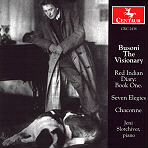Busoni’s piano music still awaits the attention that it truly deserves, for it’s the product of a remarkable musical mind. Who else could take an English tune like “Greensleeves”, stick it into a Chinese opera, and then turn it into a piano piece harmonized so as to make it appear Spanish? It was all part of Busoni’s conscious attempt to find the universal roots of music; to create a supra-national idiom encompassing with equal ease all modes of expression from the most simple to the most complex. His sources of inspiration could and did include English folk song, Native American music, the street songs of Naples, and the contrapuntal intricacies of Bach. All of these influences have their place in this well-planned recital. The major work is the Seven Elegies of 1907, a 40-minute masterpiece that would make a superb first-half recital program for any enterprising pianist. Each movement takes a well-known musical form or character piece from the past (chorale-prelude, nocturne, waltz, berceuse, folk song arrangement) and dissects it, modernizes it, and having studied it from every musical angle, sadly bids it farewell in a remarkable harmonic mixture of both new and old.
Pianist Jeni Slotchiver loves this music passionately, as both her performances and her intelligent booklet notes make very clear. True, there’s a virtuoso element to Busoni’s character that she hasn’t fully mastered: some of her finger-work sounds tentative, her scales at times uneven, and the monumental piano transcription of the Bach Chaconne strains her technique to the maximum. In the final analysis, though, the technical shortcomings are simply forgotten in light of Slotchiver’s extraordinary involvement with, and ability to project, the music’s haunting ambivalence. She’s at her best probing Busoni’s quieter, introspective moments (and that’s most of the time), where her wide range of keyboard color and sense of mystery are quite simply mesmerizing. For example, the “water music” that opens the second elegy, marked “All’ Italia! In modo napolitano”, surges up from the keyboard like some black, primordial flood, and when the music finally breaks into a folksy Neapolitan tarantella, the sense of relief is positively physical.
It’s rare indeed to hear an artist so far inside Busoni’s elusive idiom, with such strong (and poetic) ideas about each piece’s shape and sound. Slotchiver is aided in no small degree by Max Wilcox’s sonorous engineering, and if this disc really is the first in a Busoni series, as promised, it will offer a welcome alternative to Geoffrey Douglas Madge’s dreadful Philips edition, already a couple of decades old (and long out of print). Performed this way, Busoni’s music really gets under your skin. [11/27/1999]
































